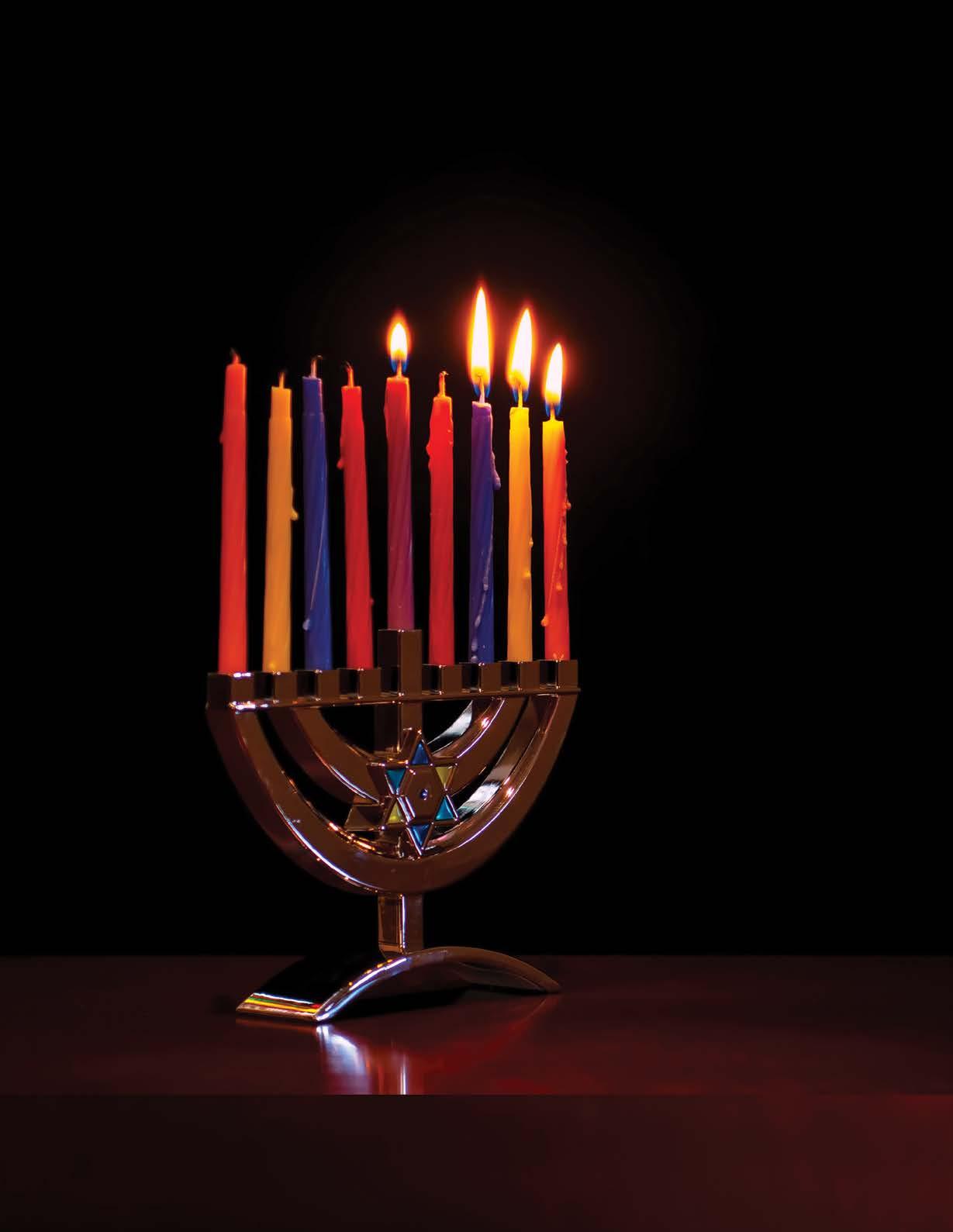
WORD FROM JERUSALEM INTERNATIONAL CHRISTIAN EMBASSY JERUSALEM // DECEMBER 2022 // USA EDITION ••• BIBI, BACK ON BALFOUR STREET! (PAGE 8) ••• and the MYSTERY OF LAWLESSNESS Hanukkah
The International Christian Embassy Jerusalem was established in1980 in recognition of the biblical significance of all of Jerusalem and its unique connection to the Jewish people. Today the ICEJ represents millions of Christians, churches, and denominations to the nation and people of Israel. We recognize in the restoration of Israel the faithfulness of God to keep His ancient covenant with the Jewish people. Our main objectives are:
• To stand with Israel in support and friendship;
• To equip and teach the worldwide church regarding God’s purposes with Israel and the nations of the Middle East;
• To be an active voice of reconciliation between Jews, Christians, and Arabs, and to support the churches and congregations in the Holy Land.
From its head offices in Jerusalem, the ICEJ reaches out into more than 170 countries worldwide, with branch offices in over 90 nations.
Our vision is:
• To reach every segment of Israel’s society with a Christian testimony of comfort and love, and
• To reach and actively represent to Israel the support of denominations, churches, and believers from every nation on earth.
The Christian Embassy is a non-denominational faith-based ministry supported by the voluntary contributions of our partners and friends across the globe. We invite you to join with us as we minister to Israel and the Jewish people worldwide by donating to the ongoing work and witness of the ICEJ.
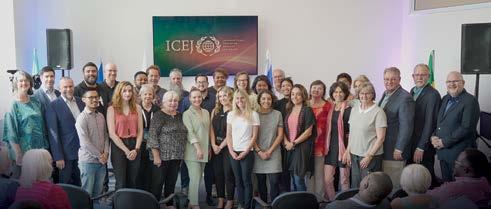
FROM JERUSALEM
CREDITS
The New King James Bible is used for all Bible references unless otherwise noted.
Word From Jerusalem is published by the International Christian Embassy Jerusalem. Reproduction in whole or in part without written permission is prohibited. Word From Jerusalem has no subscription price and is supported through contributions worldwide. The ICEJ USA Branch is a 501(c)(3) non-profit organization with offices in Tennessee, Florida, and Washington, DC. All gifts to this ministry are tax-deductible according to United States law.
Dear friends,
“He changes the times and the seasons; He removes kings and raises up kings; He gives wisdom to the wise and knowledge to those who have understanding.” (Daniel 2:21 NKJV)
As I write this, the new Israeli government has been sworn in with Benjamin Netanyahu, already Israel’s longest-serving prime minister, successfully forming a right-of-center government. Many in Israel are pleased to see Netanyahu assume the reigns of leadership once more and feel like it’s a return to normalcy.
However, much prayer is needed for Netanyahu and all of Israel’s leaders who face challenges on all sides—from internal security to employment and economic issues to the increasing threat of a nuclear Iran. (Read more about the elections on pp. 8–9.)
In our teaching article this month, I share about the Jewish festival of Hanukkah (pp. 4–5). Though Hanukkah celebrates the rededication of the temple after it was desecrated by the Greek ruler Antiochus Epiphanies in 167 BC, there is a stern warning to all of us today from this story, and much we can learn about our spiritual lives from it.
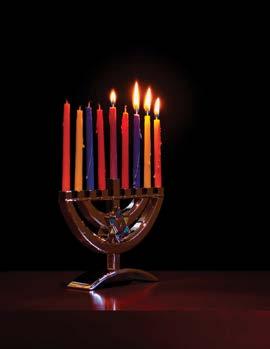
We also highlight the incredible increase in Aliyah this past year (see p. 12)— evidence of God’s faithfulness to His word to bring back his people from the four corners of the earth (Isaiah 11:12). And Susan Michael shares Part 2 of her article series “Jews and Christians Learning to Relate: Since the Holocaust” (pp. 18–19).
As 2022 comes to a close, we at the ICEJ want to extend a heartfelt “thank you” for your support. Our ministry continues full speed ahead with blessing and comforting Israel throughout the year, and we could not do it without your help. God bless you as you contemplate Hanukkah and enter the joyous Christmas season—and anticipate what God will do in the new year!
Yours in Christ, Dr. Jürgen Bühler President International Christian Embassy Jerusalem

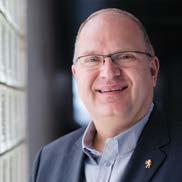

COVER PHOTO: Hanukkiah (Photo credit: Robert Thieman/Unsplash)
FOR MAGAZINE ARCHIVES visit www.icejusa.org/wfj
Ryan Tsuen, Peter Ecenroad, Nancy Schimp Photography Shutterstock, Adobe Stock, ICEJ Staff and Branches, Wikimedia
Unsplash
ICEJ President Dr. Jürgen Bühler USA Director Susan Michael VP International Affairs Dr. Mojmir Kallus
VP
Finance David van der Walt
VP
Operations Barry R. Denison
VP International Spokesman David Parsons VP AID & Aliyah Nicole Yoder Managing Editor/Publications Director Laurina Driesse USA Managing Editor Karen Engle Staff Writer Anastasiya Gooding Graphic Design/Illustrators
Commons, YouTube.com,
CHRISTIAN
Support our ministry online at:
WORD
INTERNATIONAL CHRISTIAN EMBASSY JERUSALEM // DECEMBER 2022 // USA EDITION BIBI, BACK ON BALFOUR STREET! (PAGE 8) and the MYSTERY OF LAWLESSNESS Hanukkah WORD
INTERNATIONAL
EMBASSY JERUSALEM - USA
www.icejusa.org FROM THE PRESIDENT'S DESK
FROM JERUSALEM

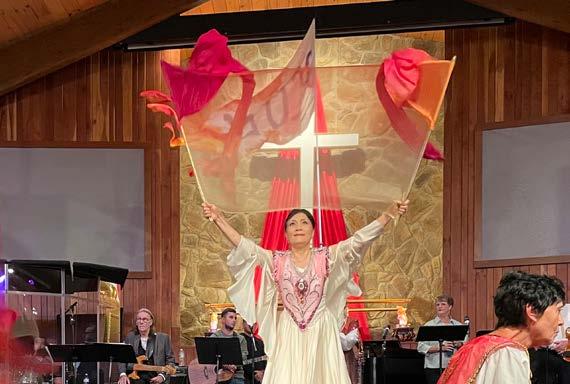
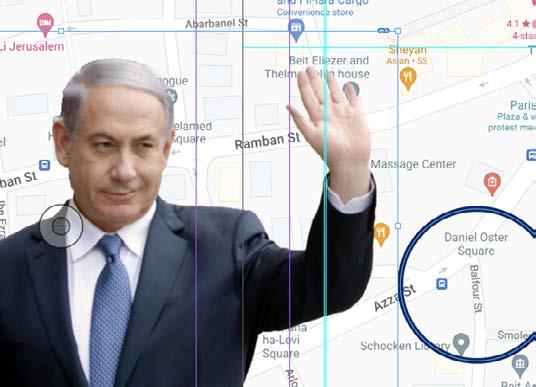
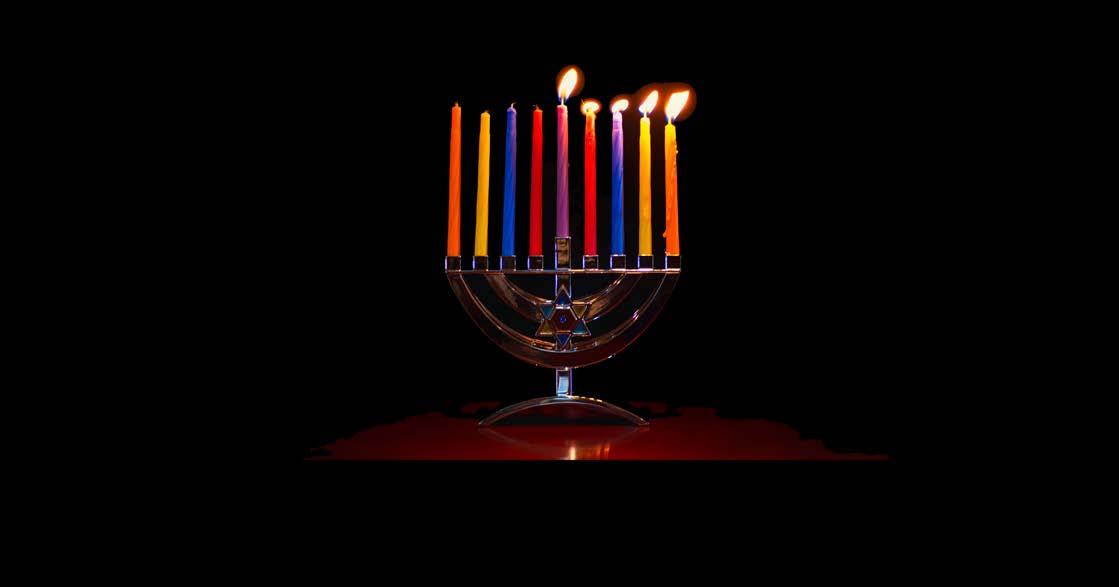
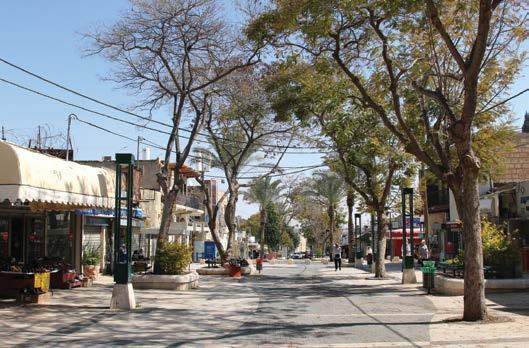
TASTE OF TABERNACLES RETURNS 6 17 CONTENTS DECEMBER 2022 USA EDITION 4 8 BIBI BACK ON BALFOUR STREET HANUKKAH AND THE MYSTERY OF LAWLESSNESS HOMECARE: BLESSING ON WHEELS 10 BRINGING A RAY OF SUNSHINE TO JEWISH IMMIGRANTS IN YOKNEAM
Hanukkah
and the MYSTERY OF LAWLESSNESS
BY DR. JÜRGEN BÜHLER, ICEJ PRESIDENT
Every year during the months of November and December, the Jewish world celebrates the festival of Hanukkah. It starts Kislev 24 on the Jewish calendar and continues for eight days. This year, Hanukkah begins the evening of Sunday, December 18 and ends on the evening of Monday, December 26. It’s a holiday that remembers the historical events that took place in 167 BC during the time when Israel was under Syrian-Greek rule and the Jewish people were suffering severe political and religious persecution.
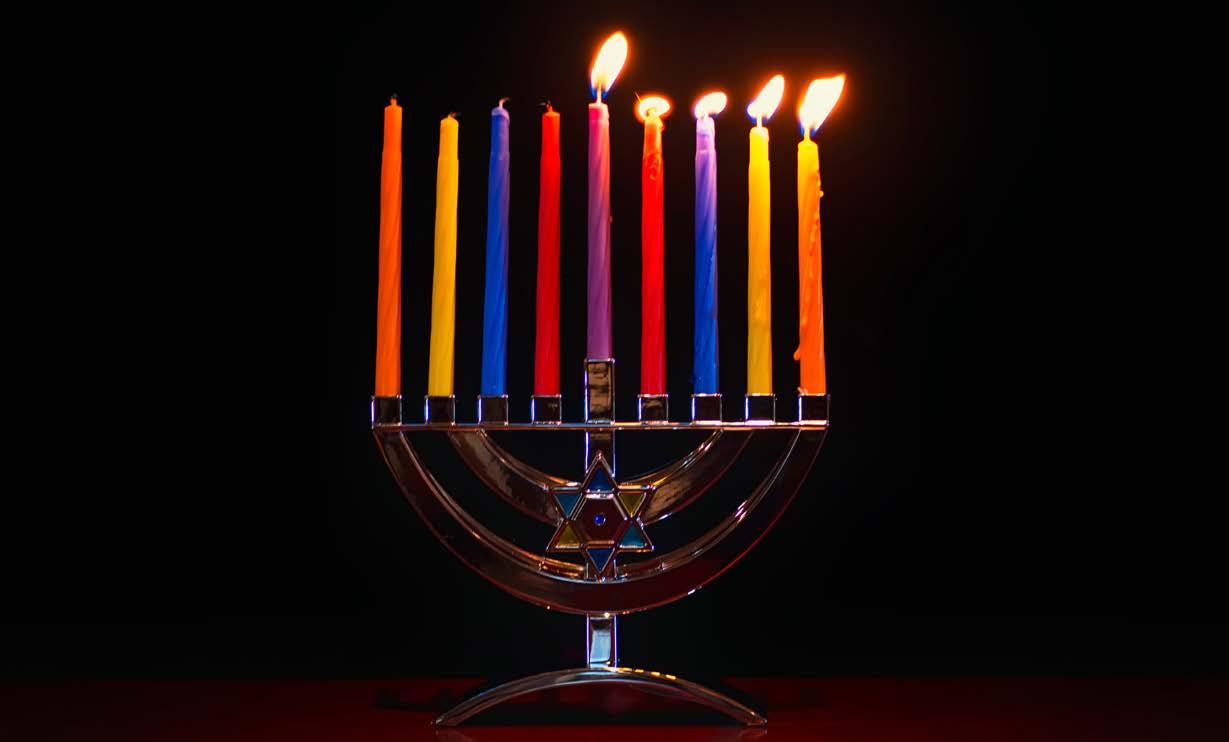
The Greek ruler Antiochus Epiphanes intended to de-Judaize the people of Israel. He forbid the study of Torah (books of Moses) and many biblical practices, such as circumcision. He also desecrated the temple in Jerusalem by sacrificing pigs. It is considered one of the darkest hours for the people of God.
Until finally, Israel was delivered through a bold leader, Judas Maccabeus. The great miracle celebrated during Hanukkah is that a
tiny portion of remaining oil for the temple’s menorah amazingly lasted for eight days, enough time to ritually produce a new supply of pure olive oil.
Hanukkah is not a “feast of the Lord” explicitly commanded by God in Scripture, as the events took place some 200 years after the last book of the Tanach (Old Testament) was written. Yet it still can be referred to as a biblical feast as the events surrounding Hanukkah were precisely prophesied by the prophet Daniel some 500 years before they happened (see Daniel 8 and 11). And we read that Jesus came to Jerusalem to mark Hanukkah, also known as the “Feast of Dedication” (John 10:22).
Antiochus Epiphanes: A Prototype
While this Jewish festival is generally not celebrated by Christians, Hanukkah still carries much significance for the church, as it teaches us about the prophetic. It presents the SyrianGreek king Antiochus Epiphanes as a prototype of the future antichrist. Daniel 11 begins by
accurately describing the flow of history, which led to the events around Hanukkah and then moves seamlessly into a more distant prophecy about a future villain—the antichrist. While today not much is preached about the antichrist, the Bible refers to him frequently (see Daniel 7–8, 11–12; 2 Thessalonians 2; 1 John 2, 4; Revelation 13, 17).
The Bible describes him as the main earthly opponent to the people of God (Israel and the church) in the immediate years before the return of Christ. It needs to be underlined, however, that the antichrist is neither a challenge nor a threat to God. Jesus, upon His arrival, will effortlessly deal with him by the mere “breath of his mouth” (2 Thessalonians 2:8). But he will represent a significant challenge to the people of God by “making war with the saints” (Daniel 7:21).
The Bible refers to the antichrist several ways. Paul calls him “the man of lawlessness,” the “son of destruction,” and “the lawless one” (2
4 | DECEMBER 2022
ICEJ TEACHING
Thessalonians 2:1ff). Jesus refers to him as “another one who will come,” while John calls him the “Antichrist” (1 John 2:18ff) and “the Beast” (Revelation 13). Daniel refers to him as a king (Daniel 11) and cryptically as “a horn with eyes of a man and a mouth to speak great things” (Daniel 7:8, 11, 20–21).
It is important to understand this embodiment of evil, as his coming is not a mere possibility but an absolute certainty. Paul saw it as a prerequisite to the return of Jesus (2 Thessalonians 2:3) and therefore, preached and wrote about it (2 Thessalonians 2:5). In addition, according to both Paul and John, the antichrist’s appearance is not just a singular event somewhere in the distant future; they saw the principles and spiritual force of the antichrist operating in their day.
I strongly believe it is also very much in operation in our day. John calls this dark force the “spirit of the Antichrist,” which is “already in the world” (1 John 4:3), and Paul refers to it as the “mystery of lawlessness” that is “already at work” (2 Thessalonians 2:7).
How the Hanukkah Story Started
Coming back to our Hanukkah story, we must ask ourselves: How did it all start back then, when Antiochus Epiphanes rose up and viscously attacked and deceived the people of God? How did the thought enter his mind to “act against the holy covenant” and to make war with the saints?
The Apocryphal book of Maccabees gives us an answer. It indicates that the thought to do so was not triggered by his own mind as a preconceived vicious plan to go against the Jews, but it originated within the people of God. In the book of First Maccabees, we read that at the same time Antiochus came to power, “lawless men arose in Israel and seduced many with their plea, ‘Come, let us make a covenant with the gentiles around us, because ever since we have kept ourselves separated from them we have suffered many evils’” (1 Maccabees 1:11). In other words, years before Antiochus ever came to Israel, the “spirit of lawlessness” was operating among the people of God, when some thought that adopting gentile practices was better than strict adherence to God’s Law. Sadly, this appeal was widely received; a delegation even took the initiative to visit King Antiochus, requesting his approval for their apostate aspirations. Consequently, Jerusalem
became a center of Greek learning and culture in the region, and a gymnasium was built there—the hallmark of Greek civilization. All activities in these gymnasiums were carried out completely nude, and soon local performers, ashamed to be identified as Jews, tried by various means to “undo” their circumcision. In the meantime, Antiochus strengthened his kingdom and conquered neighboring Egypt. On the way back to Greece, he passed through Jerusalem, and “with arrogance he went into the sanctuary. He took the gold altar, the lampstand for the light, and all its equipment.” From then on, Greek culture was not only encouraged but became the only allowed option. Study of Torah, prayer, and circumcision were banned under penalty of death, and the temple was completely desecrated.
The door that “lawless men in Israel” opened to liberalism and open-mindedness, to new cultures and more modern practices, led not just to more modern and “culturally relevant” expressions of faith, but it opened the floodgates to the destruction of the spiritual life of Israel. It is no surprise that Paul saw a similar sequence of events occurring in the last days. “The day of the Lord,” Paul writes, will not come “unless the rebellion comes first” followed by the “arrival of the man of lawlessness.” He sees a falling away (Greek: apostasia), which precedes the coming of the antichrist (2 Thessalonians 2:3ff).
How, Then, Shall We Live?
Paul also notes that “the mystery of lawlessness” is at work already. Both Paul and Jesus warn us about the last days, that it will not be legalism or overly strict obedience to the Word of God that will be the main threat but that “lawlessness will increase” to such a degree that people will fall away from their faith.
The story of Hanukkah should be a stern warning to all of us to strengthen our faith and take our stand amid the dark times we live in. But how then shall we live as everything around us seems headed for uncertainty and chaos?
The Word of God gives us hope! The prophet Daniel, who himself foresaw the difficult time of antichrist, also saw that amid these challenges there will be those “who know their God” (Daniel 11:32). He sees these people as not defeated and broken but as the New King James Version says, ones who will “carry out great exploits” (Daniel 11:32). It will be a time of great darkness, but Daniel also foresees that “those who are wise shall shine like the
brightness of the firmament,” and “turn many to righteousness like the stars” (Daniel 12:3). Also, the prophet Zechariah sees an overcoming army of “sons of Zion” who will challenge the “sons of Greece” (see Zechariah 9:13).
The battle we are engaged in, unlike at the time of Maccabees, is not against flesh and blood but a spiritual battle against “principalities, against powers, against the rulers of the darkness of this age, against spiritual hosts of wickedness in the heavenly places” (Ephesians 6:12). It is a time to fasten on our spiritual armor so “that you may be able to stand in the evil day” (v. 13).
Rededicate Your Life
The book of Maccabees tells us that when Antiochus came to Jerusalem, his main targets were threefold: He desecrated the altar, the menorah (lampstand), and the showbread table in the temple. Here’s what we can learn today from Antiochus’ act of trying to desecrate these “pillars”:
1. The menorah speaks about the prophetic testimony of the church in dark times. Let us not compromise our confession but stand firm on God’s Word.
2. The oil for the menorah’s light is the Holy Spirit, which God promises to give freely to those who seek Him.
3. The table of showbread speaks about our fellowship and communion with God and with our fellow brothers and sisters. The book of Hebrews encourages us to not “forsake the assembly, as is the habit of some” (Hebrews 10:25).
4. The altar is our prayer life. Both Daniel and Revelation speak about the man of lawlessness targeting the “regular sacrifice.” I believe this speaks of the future temple but also how Satan is trying to kill your regular fellowship with Jesus now. The most powerful antidote for the times we are living in is to strengthen our “prayer muscles.” I encourage you to use this time of shaking to strengthen feeble knees and rediscover the power of prayer for yourself. Consider starting the new year in prayer with our Global Prayer Gathering or our Rosh Chodesh prayer vigil.
Hanukkah is all about the rededication of these pillars in our spiritual lives. Be encouraged to enter the new year with great resolve to stand in faith during these challenging times we live in.
5 |WORD FROM JERUSALEM
ICEJ TEACHING
The ICEJ’s Taste of Tabernacles RETURNS
BY DARYL HEDDING, ICEJ USA DEPUTY DIRECTOR
On Friday, November 4, the ICEJ USA Branch relaunched our Taste of Tabernacles event in Niles, Ohio, with the Worship the Great I AM conference. After a hiatus of two decades, we felt the Lord was leading us to bring back this unique worship experience in the United States. Many members of the original worship team had felt the same call and were quick to answer it with a resounding “Yes!” when contacted to come and participate.
Built upon the foundation laid through the Davidic worship developed by the ICEJ in its annual Feast of Tabernacles celebration in Jerusalem, the USA Taste of Tabernacles events aim to allow believers to meet the Lord in a very real sense through a similar experience. Combining Spirit-lead worship with a full expression of praise through instrument and dance, the singular goal of this—and every—conference is to lift up the name of the Great I AM.
Those familiar with the Feast of Tabernacles would have recognized some names of leaders involved, whether from events in years past or at recent celebrations. For example, Chuck King, who served as the ICEJ’s music director in the 2000s, was on the worship team along with Dorothy Bedford, who has sung on the Feast stage in Jerusalem for many recent years. In addition, Yvonne Peters reprised her role as leader of the dance team, complemented by an array of banners dedicated to the names of the Lord.

Several speakers powerfully preached the Word during the main meetings as well as in the breakout sessions. Some who spoke included former ICEJ Executive Director Rev. Malcolm Hedding, former ICEJ USA Outreach Director Rev. Michael Hines, and ICEJ’s VP of Operations in Jerusalem, Barry Denison.
Barry stayed on after the conference to do a two-week speaking tour of Tennessee, Alabama, and Georgia. Barry’s speaking engagements included Lifepoint Church in Decatur, AL, where he met with pastor Gabe Ross; Lime Branch Baptist Church in Cedartown, GA, led by a long-time friend of the ICEJ Pastor Brian Crisp. He also spoke at First Baptist Church in Morristown, TN, led by ICEJ USA Board member Dr. Dean Haun. Barry was also interviewed on Moody Radio and an ICEJ USA young adults webinar called “Next Year in Jerusalem.”
The USA Branch of the ICEJ is so grateful for Barry giving of his time to share with these churches and venues. He brought a fresh perspective from Jerusalem, not only giving an update on the situation Israel faces both spiritually and physically but challenging the church to live up to its scriptural obligations toward Israel—not just to bless her and pray for her but pursue the Lord with such fervor as to cause the kind of jealousy Paul spoke of Romans 11:
I say then, have they stumbled that they should fall? Certainly not! But through their fall, to provoke them to jealousy, salvation has come to the Gentiles. Now if their fall is riches for the world, and their failure riches for the Gentiles, how much more their fullness! For I speak to you Gentiles; inasmuch as I am an apostle to the Gentiles, I magnify my ministry, if by any means I may provoke to jealousy those who are my flesh and save some of them. For if their being cast away is the reconciling of the world, what will their acceptance be but life from the dead? (11–15)
Join us in praying for Israel and the church in this regard—and for future Taste of Tabernacles events, as we trust the Lord to continue to move in a mighty way as He did in Niles, Ohio.
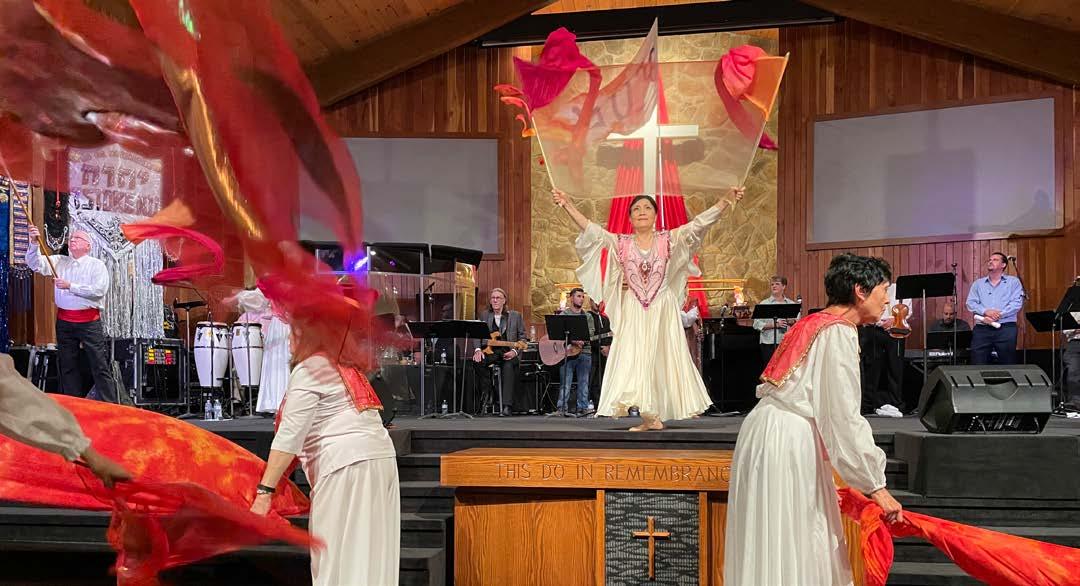
6 | DECEMBER 2022 ICEJ USA REPORT
Former ICEJ Executive Director Rev. Malcom Hedding

Bibi Back on BALFOUR STREET!
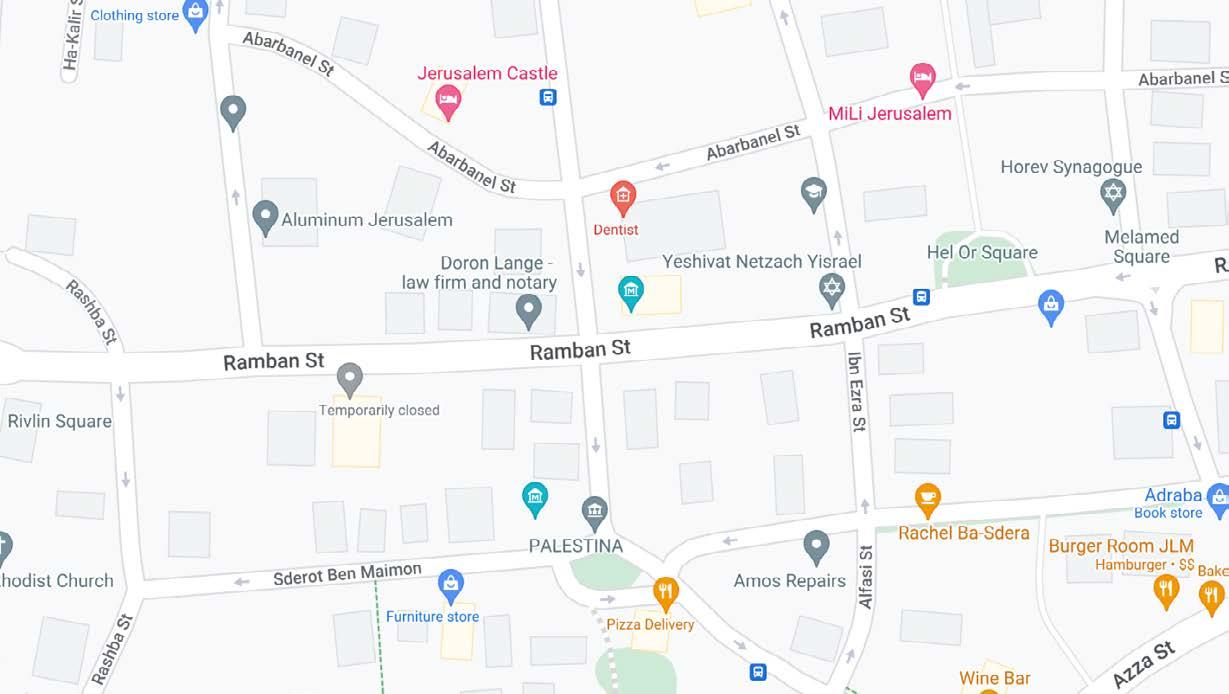 BY DAVID PARSONS ICEJ VP & SENIOR SPOKESMAN
BY DAVID PARSONS ICEJ VP & SENIOR SPOKESMAN
According to all the pollsters, the recent elections in Israel were supposed to be another close nail-biter. Instead, Benjamin Netanyahu—already Israel’s longest-serving prime minister— has a surprisingly easy path to forming a right-of-center government with a comfortable margin of at least 65 Knesset seats.
Most Israelis are undoubtedly relieved that the political impasse that forced the country into 5 election campaigns in the past 43 months has been broken. And many are pleased that a strong and proven leader in Netanyahu is poised to assume the reins of leadership once more. Indeed, it feels like a return to normalcy for Bibi to be back again in the official prime minister’s residence on Balfour Street in Jerusalem.

In assessing the latest election results, it is first worth noting that the nation somehow remained safe, strong, and prosperous over the past four years of political stalemate, even though it lacked a stable government with a clear mandate to rule. And we should be grateful for God’s hand of providence over Israel for that.
With polls showing another tight race, the surprising results came about because several parties close to the electoral threshold to enter the Knesset failed to get over the hump, giving Netanyahu’s camp a much wider margin of victory than expected.
On the Left, the failure of Meretz and one of the three main Arab parties (Balad) to reach the 3.25 percent minimum threshold meant at least eight Knesset seats had to be redistributed elsewhere, and they seem to have fallen mostly to the Right.
In the Center, Yair Lapid hoped to gain ground with voters by concluding the last-minute Israel-Lebanon Maritime Border Agreement, despite having no mandate to take such a risky, far-reaching decision as a caretaker prime minister. Although his Yesh Atid party fared well with 24 Knesset seats, the move probably was one of the main factors motivating more people on the Right to go cast ballots this time, as voter turnout was the highest in over 20 years.
Benny Gantz and Gideon Sa’ar of the more centrist National Unity alliance never really landed any punches against Netanyahu or Lapid and ended up with a pedestrian 12 seats. They say they are headed to the Opposition with Lapid, although there may be a few breakaway MKs in their list that Netanyahu could persuade to join his coalition government.
On the Right, the country has been trending rightward for some time now, with 62 percent of Israelis identifying themselves as right-wing, according to a recent study by the Israel Democracy Institute. Factoring out the Arab sector, the Jewish vote went heavily toward the nationalist camp, perennially led by Netanyahu and his Likud party, which garnered 32 Knesset seats this round.
Netanyahu successfully sank Ayelet Shaked and the Jewish Home’s chances by reminding all their voters that her faction had partnered with the “Muslim Brotherhood” by bringing Ra’am into the previous coalition. This meant that their seven seats from the last Knesset went elsewhere on the Right.
T he main beneficiary appears to have been the Religious Zionist alignment led by Bezalel Smotrich and Itamar Ben Gvir, which more than doubled
ICEJ COMMENTARY 8 | DECEMBER 2022
Prime Minister Benjamin Netanyahu
its tally to 14 Knesset seats. For some time now, one of their strongest pitches is that Netanyahu has been weak in the face of outside pressure, especially from Washington, and a vote for them is a vote to hold Bibi’s feet to the fire. It appears that many of the Naftali Bennett-Ayelet Shaked voters of recent elections bought the line and decided that rather than boycotting Netanyahu, it is better to hedge him in from within his own government.
With the ultra-Orthodox parties Shas and United Torah Judaism also faring better than expected, Netanyahu has more than enough “natural partners” on the Right to form a government within a few short weeks. But exactly where will he take the country now that he is back in power?
Bibi is the son of a noted Jewish historian, Benzion Netanyahu. He also has a strong sense of history, particularly his place in the modern-day saga of Israel. He persisted in staying in the game over these five election cycles despite the tremendous pressures and distractions of the three criminal cases against him, which political rivals have relentlessly used to try to tarnish Netanyahu as a danger to Israeli democracy. But what drove him to press on?
Surely, he senses that his already unprecedented legacy is not yet complete—that he still has something notable to accomplish in shaping Israel’s national destiny. Does he have a role to play in delivering Israel from the looming Iranian nuclear threat? Has he returned to expand on the Abraham Accords by sealing a historic breakthrough with Saudi Arabia? After all, he has reportedly already met with Saudi Crown Prince Mohammed bin Salman. Or will he finally defang the threat of
Palestinian terrorism and sideline their cause?
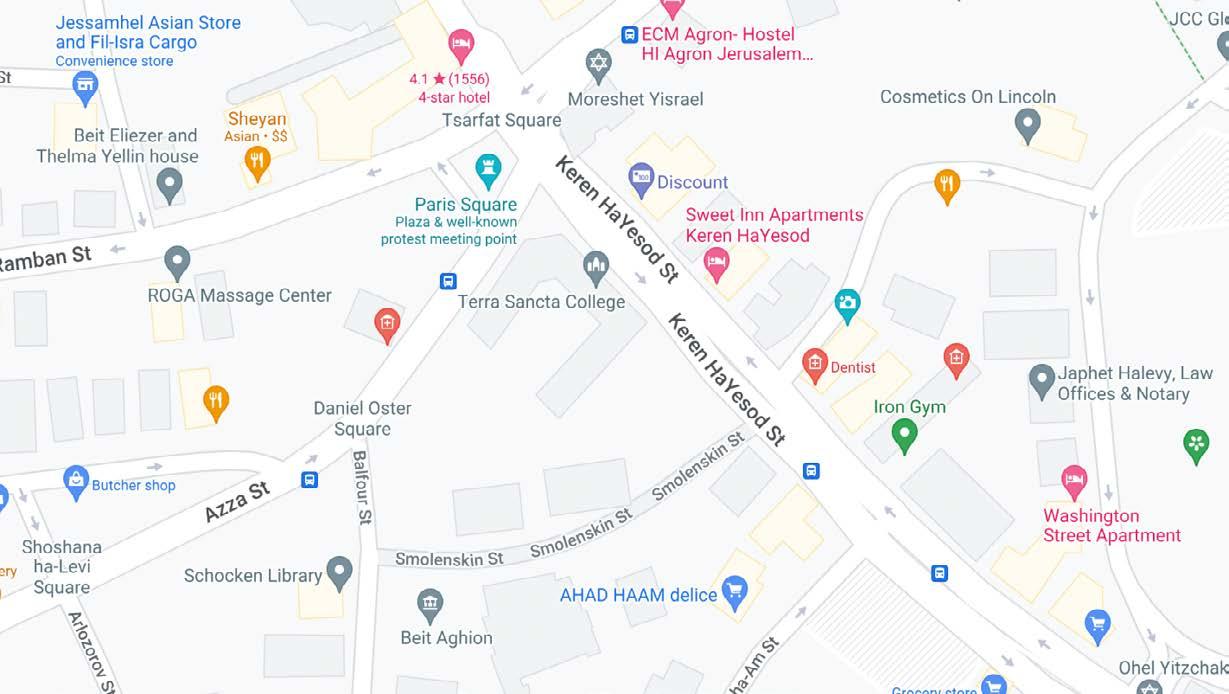
Only time will tell, but the more immediate question is how much Netanyahu will have to rely on the far-right parties in his pending coalition. Many at home and abroad are troubled by the intolerant views on the LGBT movement expressed by members of the Religious Zionist alignment. Perhaps more worrisome is that some may still hold Kahanist views—meaning they would want to forcefully transfer Arabs from the country. And Itamar Ben Gvir, particularly, is well known for staging provocative actions at known flash points like the Temple Mount and the tomb of Simon the Righteous in Sheikh Jarrah.
Netanyahu has responded that he will set the new government’s policies; thus, these misgivings about his likely coalition partners are overblown. But Smotrich and Ben Gvir have already proven they can impact Netanyahu’s decision-making. Despite his denials, there were persistent reports over recent years that Netanyahu himself once talked with Ra’am leader Mansour Abbas about joining him in a coalition or at least supporting it from outside the government. It was Smotrich and Ben Gvir who forced Bibi to abandon the effort.
T his election has undoubtedly brought to the fore the ironic situation Israel now finds itself in. At a time when the Jewish state is opening new doors of reconciliation and normalization with Arab countries across the region through the Abraham Accords, will it also be able to reconcile relations with its own Arab population? That would be an admirable goal for Netanyahu to add to his legacy, even though Ben Gvir is sure to be fighting him all along the way.
9 |WORD FROM JERUSALEM ICEJ COMMENTARY
BRINGING A RAY OF SUNSHINE TO JEWISH IMMIGRANTS IN YOKNEAM
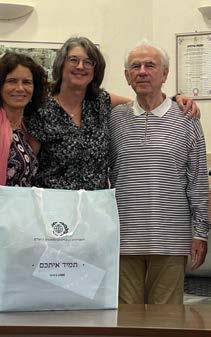
in Ukraine last February. Though the city has always absorbed immigrants, these refugee immigrants fled their country without any preparation time and left everything behind. Both young and old arrived, and many had to leave husbands and loved ones in Ukraine.
Deputy Mayor Peres recalls how in the early days of the war, his office started receiving requests to assist immigrants on their way to Israel. First came a request for a single mother who fled with her child and two bags to Budapest. She booked a flight to Israel but was held up due to regulations for a PCR test, which she could not get in time. Fortunately, Peres spoke with relevant authorities, and within minutes, mom and child were on the flight. Another lady called in tears due to troubles securing a flight: she did not have the proper veterinarian approval to bring her cat. In those first confusing and crazy days, many obstacles needed to be conquered to make it possible for the people to come with the little they had as swiftly and smoothly as possible.
The challenges continue today but in a different form. Immigrants must secure jobs, find suitable housing, and gather essential items to start a new home. There is much trauma to overcome as well. Many families require psychological care—especially family members with special needs and children. Some children receive news soon after landing in Israel that their previous school has been destroyed and friends have lost their lives.
The sun shined a little brighter for Ukrainians and other Jewish immigrants one day just after Sukkot ended in midOctober as complete strangers showed them love and practical support, moving some to tears.
ICEJ Netherlands National Directors Jacob and Hennie Keegstra accompanied Nicole Yoder, Vice President for AID and Aliyah, and her assistant, Jannie Tolhoek, to the Israeli town of Yokneam, located south of Haifa. Their vehicles were laden with care packages and
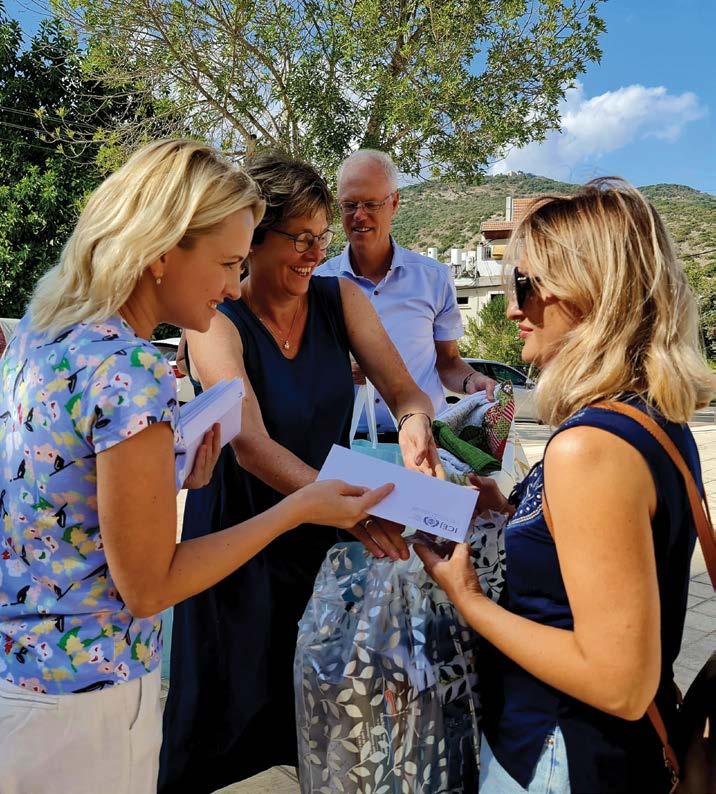
gift vouchers lovingly prepared for 40 new immigrant families. Jacob and Hennie also handed out special cards with blessings written by Dutch Christians back home to bless Israel’s new immigrants.

Yokneam Deputy Mayor Roman Peres warmly greeted the ICEJ team and shared how his city has welcomed 250 new immigrant families since the war began
When new immigrants arrive in Israel, hotels provide the initial place for them to live. The city of Yokneam dedicated a team to go to those hotels and invite immigrants to live in their city; the team has been working hard to make them feel welcome and help them settle in properly.
As the ICEJ team began distributing care packages to the new immigrants, they discovered that among
ICEJ ALIYAH & INTEGRATION 10 | DECEMBER 2022
Hennie and Jacob Keegstra (ICEJ Netherlands) give packages to a new immigrant.
the elderly, there were several Holocaust Survivors who had also fled Ukraine during the Second World War.
Georgi (89) is a Holocaust Survivor who was born in Ukraine. When the Nazis arrived, he fled with his mother and brothers to the East, leaving behind his father who was in the army. Their hometown was destroyed during the war. After the war, they returned to their city, where they rebuilt their lives, and Georgi had a 40-year career as a prominent doctor and lecturer in Ukraine.
Sadly, history seemed to repeat itself for Georgi in his old age when he was forced to flee again—first to Kyiv and then on to Israel. However, this time he is fleeing on his own; his wife has already passed away.
Deputy Mayor Peres first saw Georgi at an immigrant hotel in Tel Aviv and described him as a man in a suit with one small bag and inexpressible sorrow on his face. The city of Yokneam offered to care for Georgi by arranging an apartment for him and helping him settle in even prior to the completion of his paperwork for Israeli citizenship.
Georgi expressed his heartfelt thanks for the support of all those in the Netherlands and around the world. He was so grateful for the care package that he hugged Nicole Yoder several times to fill in where words were not enough.
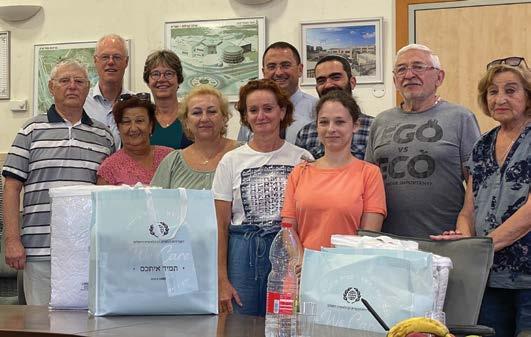
Meanwhile, Olga is a returning Israeli citizen who brought her elderly Holocaustsurviving parents to safety. Her father, who is
90 years old, and her mother, who is 86, have a similar story to Georgi: “From the beginning, Israel was there to help with everything. Also at the border, with medical teams. They have been very helpful here. It’s good to be here,” shared Olga.
Meira, who recently arrived from Ukraine, shared her traumatic experience and story of escape as tears flowed down her cheeks. She initially remained in Kharkiv, but with the close attacks and explosions and only a table to hide under, she realized that she must flee to another city. A drive that usually takes six hours took three days. Although she received love and warmth there, she knew Israel would be her final destination.
“One day I realized that Israel waits for me,” recalled Meira. “I felt like I had wings, and I had to be in Israel. So I turned to the Jewish Agency and found my way to Poland, where I finally got a flight to Israel. I want to remain here for the rest of my days.”
As Nicole shared about Christians from around the world who love Israel and want to show their care and support for the Jewish people in practical ways, Meira began weeping and sending Nicole little heart signals from across the room.
“I shared with the people who we are, why we came, and how sorry we are for the things they have suffered in
recent months,” Nicole explained afterward. “In addition to the support that we have been able to give for flights, evacuation, and hotels for them to come to Israel, we want them to know that we are thinking of them and want to help ease their way as they settle in the land with this gift. We welcomed them and blessed them that they would find a good life here in the land.”
“Most of the people we spoke to shared that they hadn’t planned on making Aliyah,” Nicole added. “Yet some had dreamed of it at an earlier stage in life or had considered their options but hadn’t really thought of it seriously until this sudden turn of events.”
“You wake up one morning to war and a geopolitical situation that you didn’t anticipate, and here we are—a global village. Suddenly, priorities change. Everything changes overnight,” noted Deputy Mayor Peres. “Without partners, we would not have managed. Thanks to the ICEJ for being one of those partners.”
Please continue to support the ICEJ’s Aliyah and Integration projects, which are making a difference in the lives of many new Jewish immigrants to Israel.

11 |WORD FROM JERUSALEM ICEJ ALIYAH & INTEGRATION
Deputy Mayor Roman Peres welcomes the ICEJ team in Yokneam.
DONATE AT: www.icejusa.org/ aliyah
Front: Nicole with Georgi, Olga in green, Meira in white t-shirt. Back: Hennie and Jacob Keegstra with Deputy Mayor Roman Peres.
A Surge in Aliyah
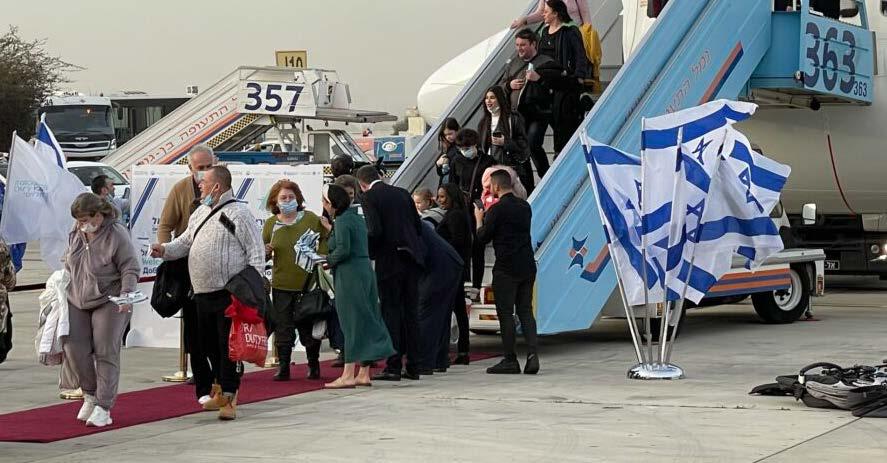 BY ICEJ STAFF
BY ICEJ STAFF
Aliyah continues to surge as Jewish immigrants from many Former Soviet Union (FSU) countries look to make Israel their new home—and the ICEJ is prepared to help. The situation is dire in Ukraine, and we know we must act fast to help those who still want to leave. ICEJ Aliyah Director Howard Flower, who has lived in the FSU for more than 30 years, says that though he has experienced many up and downs, “this crisis is the most horrific thing I have witnessed.”
Though some Ukrainians are holding on in their home country amid plummeting temperatures and electricity and food shortages, many Jewish people decided it was too much to bear and found a way out through a neighboring Eastern European country, like Poland, Moldova, or Roma nia. From there they continued to Israel.
This is where you can get involved through the work of the ICEJ. A suggested gift per oleh (immigrant) of $1,000 helps provide flights, ground transportation, and hotel accommodations. However, new immigrants’ needs are many; once in Israel, they need assistance toward integra tion programs that help them settle into life in the land.
Current statistics speak volumes concerning the ongoing
plight of the war-torn Ukrainian people. Ukrainian Immi gration to Israel has already increased by 533 percent over this same period last year. But the Ukrainian Jewish pop ulation is not the only one looking to leave. Russia’s Jews are also showing an unprecedented increase in Aliyah of 427 percent over the same period last year, and there has been a 401 percent increase from all Former Soviet Union countries. These are the highest Aliyah numbers in over 20 years.
We must also be poised and ready for Aliyah flights from Ethiopia, which will also resume in the coming weeks. We are expecting some 1,500 Ethiopian Jewish immigrants— about the same number that already arrived in Israel this past year!
Due to the generosity of our donors, the ICEJ has already assisted more than 3,500 immigrants this year—and we’re ready to welcome more home before year-end.
We are so thankful God has allowed us to play a small part in His great plan to gather His children scattered through out the world. Consider partnering with the ICEJ in its on going efforts to bring comfort, love, and support to those re turning to Israel, the land promised to their forefathers.
ICEJ ALIYAH & INTEGRATION
Be a part of this modern-day miracle! Donate today at: www.icejusa.org/aliyah

SHARE THE SPIRIT OF GIVING
This holiday season don’t miss the opportunity to do something deeply meaningful for someone in need through one of ICEJ’s impacting projects. Here are some creative ideas:

• Let your kids or grandkids participate in choosing who to help
• Collect an offering as a small group or Bible study and be part of establishing a bomb shelter
• Forego some family gifts and redirect those funds to assist families coming home to Israel
Keep reading to explore all the ways you can share the spirit of giving!
Adopt a Resident
Make a profound difference in the life of a Holocaust Survivor residing at our assisted living home. When you give to this fund, you join a team of dedicated caregivers who look after these Survivors’ daily needs.
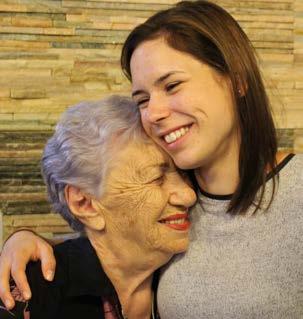
“It is wonderful to live at the Haifa Home. Each holiday is celebrated for at least two weeks. Children are coming, soldiers, police, and other groups to celebrate the holidays with us. The Haifa Home is one big family.”
—Naomi (88) has lived at the Haifa Home for 7 years Scan to donate
ALIYAH
Help Jewish Families Come Home
With antisemitism on the rise and a shaky economy, the need for Jewish families to make Aliyah to Israel is more critical than ever. In Isaiah 49:22, the Lord invites the gentile nations to participate in this great ingathering back to the promised land. When you support ICEJ Aliyah, you play a crucial part in this prophetic fulfillment by helping needy Jewish families come home and thrive.
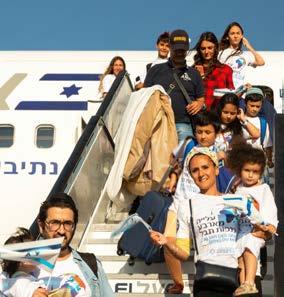
Your gift toward Aliyah helps with:
• Travel costs to Israel
• Basic needs upon arrival
• Absorption costs—introductory classes to Israeli language, culture, and society
“Thus says the Lord God: ‘I will gather you from the peoples, assemble you from the countries where you have been scattered, and I will give you the land of Israel.’” (Ezekiel 11:17)
SUGGESTED GIFT
Average cost per person: $565
the cost: $50
www.icejusa.org/aliyah
SUGGESTED GIFT
Average cost per person: $565
Shared cost: $50
HOLOCAUST SURVIVORS’ CALL CENTER
Ensure Holocaust Survivors Are Not Alone
Extend love from a distance to thousands of elderly Holocaust Survivors struggling with loneliness and painful memories. The call center operates 24 hours a day on weekdays and is manned by staff and community volunteers from across Israeli society.
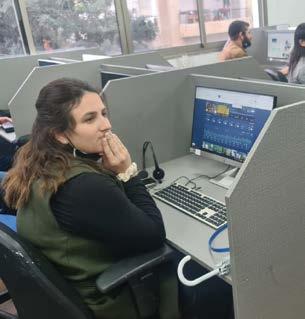
www.icejusa.org/adopt www.icejusa.org/call-center
Scan to donate



Share
HAIFA HOME FOR HOLOCAUST SURVIVORS
Scan to donate
GIFT $25
SUGGESTED
SUGGESTED GIFT
Average cost per person: $2,500 Share the cost: $50
GIVING THIS HOLIDAY SEASON
HELP HOLOCAUST SURVIVORS FROM UKRAINE



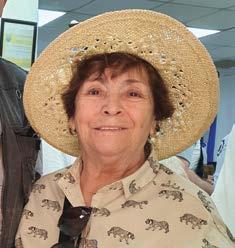
The unexpected influx of 16 new residents who are at the same time new immigrants from Ukraine brings with it many challenges and extra costs. Among many other necessities, we need to:
• Buy furniture for new immigrants’ rooms that adapt to their medical conditions
• Finish the new building, which includes installing an elevator, building a room on the third floor, and furnishing the top floor
• Initiate a garden project in all buildings
• Organize trips to help these new immigrants become familiar with their new country
BOMB SHELTERS
Bring Hope and Peace to Jewish Families

Jewish families in Southern and Northern Israel live in constant fear because of frequent rocket attacks. Simple things like going to the market or school or engaging in outdoor activities require the ability to reach a bomb shelter within 10 seconds when an air raid siren sounds. When you gift a bomb shelter or help share the cost, you bring hope and peace to people in dire need.
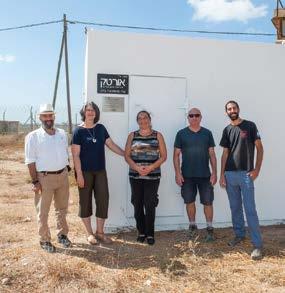
“We feel safer. [With the bomb shelters], children can go outside knowing they can find shelter when the rockets start.”
Ofir Libshtein, mayor of the Sha’ar HaNegev Regional Council, Southern Israel
Provide Basic Food Items
Increasingly in Israel, families struggle to make ends meet—and many are below the poverty line. Gifting a food basket makes a profound difference for families during the holidays or any time of year.
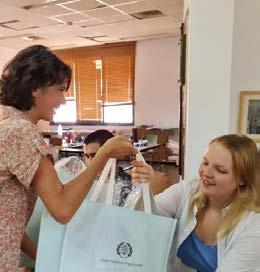
“The LORD has founded Zion, and the poor of His people shall take refuge in it.”
(Isaiah 14:32)
ICEJ AID Touch Lives and Provide for Basic Needs When you give to ICEJ AID—the Embassy’s social assistance and benevolence ministry—you participate in touching people’s lives in every sector of Israeli society. Some of our projects include: Scan to donate www.icejusa.org/aid SUGGESTED GIFT $100 SUGGESTED GIFT Average cost per person per year: $2,500 Share the cost: $50 SUGGESTED GIFT Average cost per bomb shelter: $26,000 Share the cost: $150 SUGGESTED GIFT $250 (helps assist a child for one year) Share the cost: $20 Scan to donate Scan to donate “That’s why we’re grateful to be in the Haifa Home and in Israel. We feel so loved and welcomed here. They take wonderful care of us, and we are so happy to be here.” —Maya (84), a new immigrant from the Ukraine who came to the Haifa Home in July 2022 www.icejusa.org/haifa www.icejusa.org/bomb-shelter Support Orphans, Children, and Youth-at-Risk Many Israeli youth have no family or are at-risk. Your gifts to ICEJ AID allow us to assist this neglected segment of Israeli society by providing: • Playground equipment • Mentors • A comfortable, safe, loving, and supportive environment • Help transitioning to adulthood and preparing for college and careers

Blessing on Wheels
B Y MAXINE CARLILL
Homecare nurse Corrie van Maanen picked up a new immigrant from Ukraine from Ben Gurion airport. As her passenger shared her story of escape from Ukraine, Corrie could hardly imagine what the woman went through. How she recently fled from one place to another in Ukraine, with tense delays between each stop; how a two-hour car trip took 12 hours; how when she crossed the border to safety in Poland, she still had to rely on the goodness of strangers for a few days. As Corrie glanced at the woman in her Homecare car eating the lunch Corrie had provided, she wondered: How long since the woman last ate?
But then this new immigrant to Israel told Corrie something that has stayed with her:
“I knew from the first minute I put my feet on this path of escape that the God of Israel was with me—every step of this scary journey.”
A week before, Corrie had received an excited and, at the same, time frightful phone call from Katya. Katya’s words tumbled out over each other as she exclaimed, “My mother got out of Energodar, and it is a great miracle. She is on her way to Israel!” Energodar is a city in Ukraine with a large nuclear plant; for months, it was impossible to get out of the embattled town.
Katya had immigrated to Israel with her husband several years prior and missed her mother greatly. The newlywed couple had married young and soon had three children, which unfortunately strained their marriage and eventually, they separated. It was then ICEJ Homecare came into Katya’s life with financial and practical help to support her in that difficult season.
A week later, Katya called Corrie again from her home in Beersheva, this time in panic: “My mom arrives tomorrow, but there is nobody who can pick her up from the airport.”
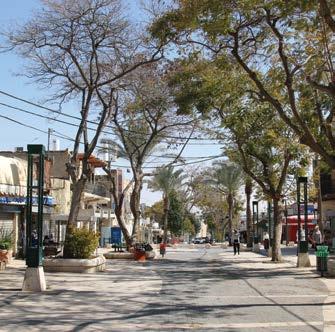
Corrie stepped in to pick up Katya’s mom and recounted what became a day of joy:
“The next day I drove to the airport with a photo Katya had given me,”
she said. “The doors of the Arrivals Hall opened and closed while I waited with expectation. Then I spotted a lady coming through the door alone. She looked tired and was obviously looking for someone she did not know. The moment we recognized each other, there was relief! After a big hug and tears from the pressure of the past few days, Katya’s mother was relieved knowing she was safe. She was in Israel.”
Even though her husband, son, and her son’s family are still in Ukraine, when she arrived in Beersheba and reunited with her daughter and grandchildren, it was an emotional moment with tears of joy and hugs—a thousand words unspoken.
Driving back to Jerusalem, Corrie was mindful of the character of Homecare.
“It is all about relationships,” she explained. “It’s all about stepping in where we see the need. It is so much more than nursing care and may cost time and effort, like today’s mission. We made a difference for one mother. A car became the vehicle of blessing to make it possible.”
A few days later, Katya’s mother heard that her city had come under a huge rocket attack; her neighbor’s house was damaged, and people she knew were killed. Although she loves being with her daughter, she still battles homesickness and misses her loved ones left behind.

Since the war in Ukraine broke out eight months ago, the work of Homecare has taken on an extra level of service. It not only provides immigrants with assistance in coping with daily life in Israel with all its challenges but also involves listening to the stories of family members and friends still living in a war-torn country. We only understand in part what living in a war zone with no certainty of tomorrow is like. But we do know the calling we have to comfort the Jewish people, especially in this time of need.
Many new arrivals from Ukraine and Russia have suffered trauma leaving them with deep emotional pain, and Israel steps in with the right help. We encourage those from the nations to pray and to give, to be part of this urgent and increasing Aliyah.
ICEJ HOMECARE
Support Homecare at:
www.icejusa.org/homecare
“My mother got out of Energodar, and it is a great miracle. She is on her way to Israel!”
The embattled town of Energodar, Ukraine (photo credit: Agencia Nova) Beersheva, Israel (inside circle; photo credit: Times of Israel)
Your Israel Answer Jews and Christians Learning to Relate

Since the Holocaust Part 2 of a 3-Part Series
By Dr. Susan Michael, ICEJ USA Director
In Part 1 of this series in the November issue of Word From Jerusalem, we covered the history of Jewish-Christian relations from the book of Acts through the Holocaust. And while it is a very sad tale of separation and contempt, there has been much positive development since that time. The death of six million Jews in the heart of Christian Europe had served as a wake-up call in many respects.
After 1,900 years of praying “next year in Jerusalem,” the Jewish people had already begun making their way back to their home land when, thanks to the breakup of the last Islamic (Ottoman) Empire and a wave of nationalism in the early twentieth century, the stage was set for the birth of Israel and its ratification by the United Nations. The Holocaust was not the catalyst for this re turn, but it did produce a wave of international support for the idea.
Impact of the Holocaust on Christianity
The tragedy of the Holocaust also sent a shockwave through the Catholic and Lutheran churches predominant in Germany at the time. Eventually, every major Christian denomination felt the ripple effect.
The impact on the Catholic Church was astounding. Under the leadership of Pope John XXIII, the Catholic Church convened the Second Vatican Council and issued the Nostra Aetate (Latin for “In Our Time”). It was a landmark call to reexamination and reform. It reaffirmed that God’s covenant with Israel is still in effect and called for productive dialogue between Catholics and Jews as well as a new appreciation of the Jewish Scriptures (the Christian Old Testament). And finally, there was a call to reexam ine the “teaching of contempt”—the charge of deicide that had been placed on generations of Jewish people.
The Catholic Church went so far as to change their Good Fri day liturgy, which had often resulted in antisemitic attacks by worshipers on their way home from services. Many Evangelicals today do not realize that for centuries Easter week was the most
dangerous time of the year for Jews. This cataclysmic change in Catholic theology reduced this threat greatly.
The Lutheran Church went through a similar shake-up. It’s founder, Martin Luther, had ended his life rabidly antisemitic, and his book The Jews and their Lies had been reproduced and distributed by the Nazi regime to obtain Protestant support for their treatment of the Jews. Luther’s book called for a “solution,” and Hitler came up with the “final solution”—annihilating the Jewish race.
Several years after the shock and tragedy of the Holocaust, the Lutheran denomination disassociated itself from Martin Lu ther’s horrendous writings. In time, every major Protestant de nomination began to issue statements against antisemitism and affirming the Jewishness of Jesus and the roots of the Christian faith.
Unfortunately, neither the Catholics nor the Protestants went so far as to recognize Israel. And as the Boycott, Divestment, and Sanctions (BDS) movement has made its way into some of those Protestant denominations, they have opposed Israel, failing to recognize the BDS movement as a new expression of the anti semitism they once disavowed.
Impact of the Establishment of Israel
The Evangelical movement was less affected by the Holocaust because its center of growth was in the United States. It is also a largely grassroots movement without one denominational head quarters to provide leadership on an issue. But this movement is significant and has been impacted greatly by another historic event—the birth of the State of Israel.
Since Israel was established in 1948, millions of Christians have visited the Holy Land. Many came home appreciating the privi lege of pilgrimage granted by the government of Israel. They benefitted from the Jewish State’s care for the Christian sites and archaeological artifacts supporting the Bible. Some of these
18 | NOVEMBER 2022 18 | NOVEMBER 2022 18 |WORD FROM JERUSALEM
us at:
and get your question
Visit
www.IsraelAnswers.com
tourists came away impressed by the fervent Jewish faith they encountered and their interactions with the locals.
Most importantly, these Christians are reading their Bible with a new worldview. No longer are the Jews a persecuted and dispersed minority that seemed to be suffering for some wrongdoing. They are back in their land, just as God had promised they would be, and they are building a nation that is leading the world in science, technology, and innovation. God’s promises to Abraham and Moses, as well as His words through the Hebrew prophets, are all coming to pass!
The Growth of the Evangelical Movement
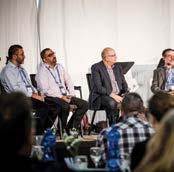
This theological realignment is impacting global Christian ity significantly because of the size and strength of this new Bible-based segment of the faith. Since Israel was established, Evangelical Christianity has become the fastest-growing seg ment of Christianity, fueled particularly by the rapid growth of the Pentecostal part of the movement.
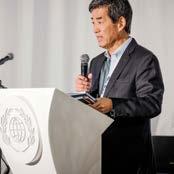
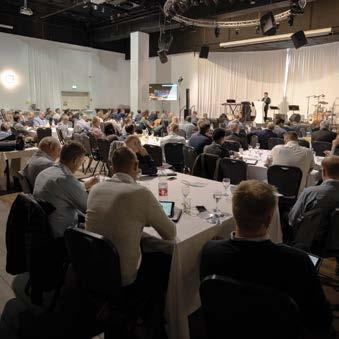
Evangelicalism is a Bible-based movement that is largely phi losemitic and pro-Israel. And it is growing like wildfire in the global south—Africa, Asia, and Latin America. Already in some Latin American countries, Evangelicals outnumber Catholics. If this growth continues, Evangelicalism will be come the largest segment of global Christianity. And this will have a profound and positive effect on Jewish-Christian rela tions.

Learning to Relate
With this amazing turnaround in Christian history, we see the blossoming of a whole new level of Jewish-Christian rela tions in our day. It is critical that we protect this friendship and nurture it, so it matures to full adulthood. Therefore, in addition to understanding this history, we need to learn from those who have been pioneering this new relationship over the last 50 years. We will share their advice in Part 3 of this series on Jews and Christians Learning to Relate.
question about Israel answered!
POSSESSING THE LAND OF PROMISE

www.icejusa.org/envision ENVISION PASTORS & LEADERS CONFERENCE
around the globe, refresh your spirit, and receive a renewed vision for your ministry. Gain new insights into Israel through briefings by key figures in the Land.

















 BY DAVID PARSONS ICEJ VP & SENIOR SPOKESMAN
BY DAVID PARSONS ICEJ VP & SENIOR SPOKESMAN







 BY ICEJ STAFF
BY ICEJ STAFF
























